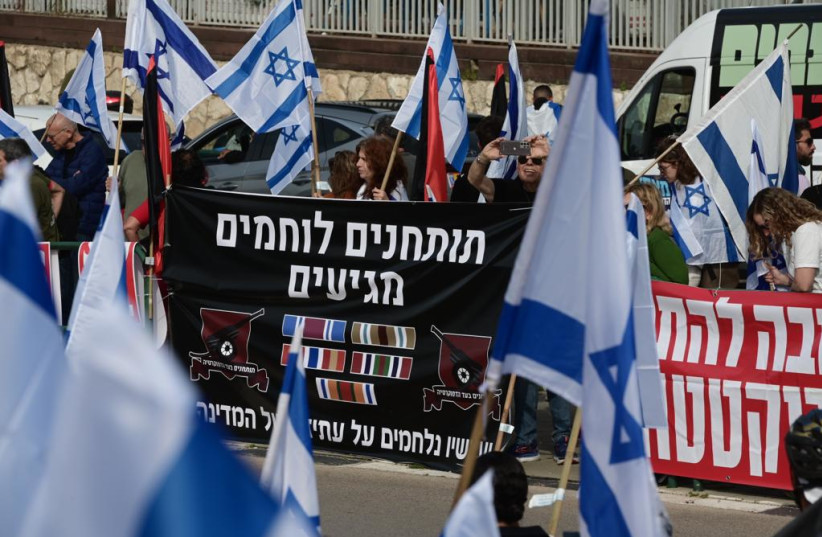After months of a political and social rift that has seeped into the Israeli army, Israeli deterrence seems to have been severely weakened to a point where Israel’s enemies feel comfortable enough to strike. It seems that the recent chain of violent events began with several rocket launches into southern Israel from Gaza that drizzled for several days in March and now in April.
This past Thursday and Friday, the violence quickly escalated. It began on April 6, with dozens of launches from Lebanon in an attack of quantity that Israel has not experienced since 2006 and continued with deadly terror attacks in the Jordan Valley and Tel Aviv, claiming the lives of three. In light of recent events that prompted a call for action from within the coalition, it is becoming difficult for the Israeli government not to respond with force.
Considering recent events, is there also an opportunity within this seemingly unavoidable conflict? When examining what may have led to this moment, the current period’s unique circumstances must be considered. For several months now, Israel has been facing deep social discord in light of the suggested changes in the judicial branch presented by the Israeli government.
What events have helped worsen Israel's divisions?
These proposed changes have led to the division of the Israeli public into two camps that even argue over the name used to describe the proposed changes: one camp is for the judicial reform and the other is against the judicial overhaul. This division and dispute have led to massive protests and demonstrations from both sides.
The disputes in Israeli society even penetrated the Israeli military, which strives to be an apolitical body, when dozens of fighter pilots refused to train, in protest of the suggested changes in the judicial branch.

Alongside the deep social polarization, there are at least three other significant events that have deeply affected Israeli deterrence. First, Israeli-American relations were negatively impacted when President Joe Biden declared that Israel cannot continue down this road and that there would be no Prime Minister Benjamin Netanyahu invitation to Washington in the near term.
Secondly, there was the initial announcement that Defense Minister Yoav Gallant would be dismissed after he called to halt the judicial changes. Gallant remains as defense minister but the preliminary announcement by Netanyahu led to massive protests and the eventual announcement that the judicial changes would in fact be delayed.
Third, the month of Ramadan, a very tense time of year, has led to outbursts of violence throughout the years, the most severe recent example has been at the time of Operation Guardian of the Walls in May 2021.
Israel’s enemies, mainly Hamas, Iran and Hezbollah, were keeping a close eye on Israel, sensing its weaknesses and waiting for the right moment to strike. It seems that the right moment to strike occurred on April 6, following clashes between the Israeli police and Muslim worshipers on the Temple Mount that led to missile launches from Gaza early Thursday morning and dozens of rocket launches from Lebanon on Thursday afternoon.
When looking at the attacks from a narrow perspective, they may strike as a logical plan: strike your opponent when it’s weak and leverage its weakness to gain a strategic advantage. Is dragging Israel into a large conflict that is almost inevitable at this point in time a strategically smart move on behalf of Israel’s enemies?
Thorough academic research discussed the phenomenon of rallying around the flag, which, practically speaking, is the tendency of societies to unite in the face of an external threat. The term in this context was coined in 1970 by the American political scientist John Mueller in his study, “Presidential Popularity from Truman to Johnson,” in which he discussed the tendency of uniting when facing international crises.
Several examples of this phenomenon are visible throughout the years, a recent one being Russia’s invasion of Ukraine which has led to unity among the American people across ideological and demographic lines, according to an Economist/YouGov survey, or even the rally around the flag effect that was visible during the COVID-19 crisis around the world.
A slightly more relevant example when discussing Israel can be seen in 2006’s rally around the flag effect in Israel brought on by the Second Lebanon War that was “expressed in a surge in trust toward the IDF and avoidance of criticism,” as mentioned in Roni Tiargan-Orr and Meytal Eran-Jona’s The Israeli Public’s Perception of the IDF. The Israeli tendency to rally around the flag in times of crisis is also mentioned in Asher Arian’s National Security and Public Opinion in Israel where he writes that “the [Israeli] public seems to rally ‘round the flag unfailingly in times of crisis.”
Alongside the overall civil tendency of rallying around the flag in times of external crisis and the Israeli one in particular, it is also important to note that Israel is entering a very unifying time of year regardless of any external crisis: the country’s Remembrance Days and Independence Day – all to occur in April.
Taking all of the above under consideration, the recent attacks on Israel both from Gaza and from Lebanon may lead to a sharp and sudden public union, a large-scale rally around the flag on behalf of Israeli civil society that, in light of both the recent attacks and Israel’s days of national grief and pride, may unite it under the urgency that is the protection of the Israeli state.
And suppose the Israeli public unfailingly rallied around the flag in times of crisis, as Asher Arian claimed. In that case, the massive attack from Lebanon might turn out to be a strategic mistake that may be the start of much-needed Israeli national healing that will result in a more resilient and deterring Israel.
The writer is a Middle East and political science researcher at Bar-Ilan University and an intern at The Institute for National Security Studies (INSS).
